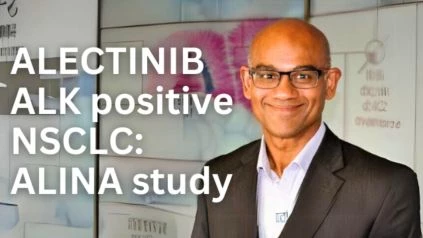At ESMO 2023, the speaker had the pleasure of presenting the findings from the global phase 3 Alina study. This study marked the first randomized investigation of aninhibitor in patients with entirely resected ALK-positive non-small cell lung cancer. The presentation highlighted the high recurrence rates after surgery in this patient population and emphasized that the advances seen in early-stage immunotherapy didn’t apply here. The standard of care still revolved around Adan Platinum-based chemotherapy.
In the Alina study, the effects of two years of LBA2 – ALINA treatment on disease-free survival after surgery were examined. The study involved 257 patients with completely resected stage 1B to 3A ALK-positive non-small cell lung cancer. These patients were randomly assigned to receive either two years of standard chemotherapy.
The primary endpoint of the study, disease-free survival, favored the LBA2 – ALINA treatment. The hazard ratio of 0.24 was highly statistically significant, indicating a significant improvement in disease-free survival compared to chemotherapy. Further subgroup analyses, including stage and nodal status, showed consistent benefits with hazard ratios of 0.21, 0.24, and 0.25 across stage 1B, 2, and 3A diseases, respectively.
The study also examined the endpoint of CNS (central nervous system) disease-free survival, which is crucial due to the predisposition of ALK-positive lung cancer patients to develop brain metastases. The results showed that treatment with ALECTINIB significantly improved disease-free survival in this aspect as well, with a hazard ratio of 0.22.
Moreover, the presentation emphasized that treatment with election was well-tolerated, with a low incidence of grade three or grade four adverse events. Consequently, the findings of the study provide strong support for considering election as a viable LBA2 – ALINA treatment option for patients with entirely resected stage 1B to 3A ALK-positive non-small cell lung cancer.

